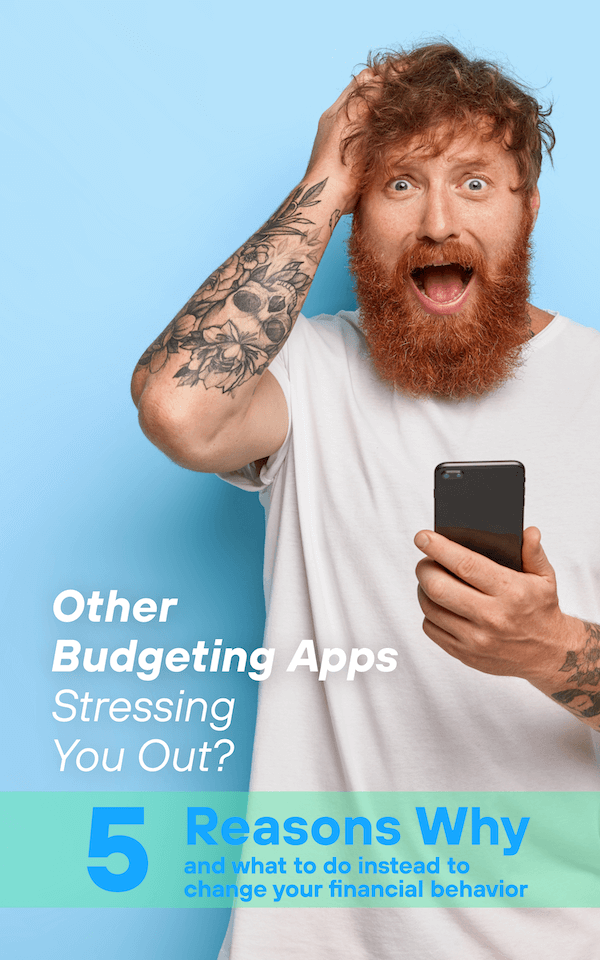In these difficult economic times, many of us are looking to improve our financial behavior. So we may look for a budgeting app to help alleviate our financial stress.
Unfortunately, by and large, these apps just don’t work.
In an American Psychological Association (APA) survey, Stress in America, 6 of 10 U.S. adults said their biggest personal stressor is money.
And although there are budgeting apps that promise to help, most budgeting apps don’t change financial behavior long-term.
Without a doubt, these apps track the money going in and out of your accounts, but, for multiple reasons, they don’t create actual behavior change.
Here are 5 reasons why your budgeting app isn’t helping to change your behavior.
Related: Can Mental Accounting Hinder Your Financial Goals?
1. You Don’t Have to Use the Budgeting App Daily
If you’ve spent time setting up your new budgeting app, your motivation is high.
After all, you’ve spent time linking your bank and credit card accounts so you can track your account activity.
However, once you’ve automated the tracking of your accounts, you don’t have to think about it on a regular basis.
In fact, according to a Lexington Law survey, 26% of Americans check their bank account only once a month (8%) or even less frequently (18%)!
You may have notifications set up to warn you about an issue with your budget. Even if the alert reaches your inbox, it’s easy to ignore if you don’t have to launch the app to handle your day-to-day spending.
2. Your Budgeting App is Too Complicated to Manage
Budgeting apps do some heavy lifting for you, pulling in the numbers from your financial accounts.
But to successfully change financial behavior, you’re required to put in work, too.
If you’re checking in with your finances only once a month (sometimes less frequently), you’re looking at a lot of information to sift through and make sense of.
Managing your budget in bulk through an app, then, gets tedious.
This is especially true if certain purchases are categorized incorrectly. For example, your budgeting app might categorize a Frappuccino purchase as a “shopping” expense, rather than a “food” expense, if your Starbucks is inside a Target store.
Also, not all budgeting apps account for nuanced details. This might come up if you paid for brunch with a friend using your debit card, but your friend reimburses you later. This type of discrepancy can make managing your budget complicated and demotivating to sustain.
Read: How Venmo Is Disrupting Your Budget
3. Your Budgeting App Doesn’t Have Real-Time Consequences
In behavioral economics, “present bias” occurs when you make choices that give you rewards in the present, versus making choices that give you greater rewards in the future. This is the well-known phenomenon known as “instant gratification.”
Since many budgeting apps aren’t a presence in real time (like when you’re in a department store and spot a pair of shoes you hadn’t planned on buying), there’s no immediate consequence to bar you from making an impulse purchase.
Instead, the immediate, “instant” effect is the reward of having the shoes. And the long-term reward of building an emergency fund, the much less enticing reward, takes a back seat.
The shifting of your spending habits — from saving money, to buying shoes — happens in an instant, almost passively.
You may eventually be reminded that this off-budget snafu happened, if you engage in a self-imposed budget review, but you can only address it retroactively.
You’ve already exceeded your monthly shopping budget, and you didn’t meet your savings goal for the month. No behavior change, and you’re even farther from your financial goals. Thumbs down!
Read: The Difference Between Proactive and Reactive Budgeting
4. Your Budgeting App Doesn’t Hold You Accountable
Often, budgeting apps assume that your financial journey involves a story of one.
Only you can hold you accountable. Going in and analyzing what worked and what didn’t, and making changes to do better next month is a lot to ask of someone who’s started a new budget or may have trouble keeping a budget.
Budgeting apps don’t always have the option for inviting your support network into your financial picture.
Your spouse, for example, has a stake in your budget. You might be dealing with a shared household budget to manage, or have shared life goals.
Read: How Qube Money Will Help Couples Budget Better
Whether you need to budget for the mortgage every month, or set money aside monthly toward a home down payment, communicating your spending habits with your spouse can lead to greater accountability and motivational support.
As an added bonus, according to psychology experts, a budgeting approach that offers your partner transparency encourages trust and collaboration in the relationship.
Learn more about our Joint Account features.
5. Your Budgeting App Doesn’t Change Financial Behavior
Successfully staying within your budget each month requires more than a basic app. While a budgeting app gives you an overall picture, your own willpower is a necessary part of the equation.
Those with low willpower are more likely to over-spend, says the APA.
Willpower is an internal resource that you spend, like money. If you expend willpower multiple times in a short period of time, the less willpower you will have over time.
Similarly, if you’re faced with multiple financial decisions in a short period of time, you’ll exhaust your willpower faster, making yourself susceptible to over-spending.
Making deliberate, bite-sized decisions daily, versus making multiple decisions in one sitting (like reworking various budgets and money goals) can help preserve your willpower.
This is what will change your financial behavior.
Read: How to Use Qube to Avoid Overspending on Amazon!
How to Budget for the Long-Term
Budgeting apps can help you get control of your money, to an extent. They give you the numbers and figures regarding how your money management is performing.
Ultimately, however, you need more to give your budget the gas it needs to run optimally. That way you don’t fall into the category of “budgeting apps didn’t work for me.”
A few things a sustainable budget includes are:
- Automated regular payments: automatically sets aside funds for non-negotiable expenses, like rent, utilities, and monthly debt payments.
- Daily check-ins: forces you to look at your budget categories and how you’re doing on a daily basis.
- A simple concept: shows you every dollar coming in and out (like going on a diet: calories in, calories out).
- A way to tag along with you: is part of your day-to-day spending (or saving) habit.
- Accountability: encourages you to recruit your own personal accountability buddy to keep you honest about your progress.
- It shifts your psychology: creates a tangible and concrete change in your actual behavior.
Read: Budgeting 101: How to Create a Good Budget
Conclusion: Why Budgeting Apps Don’t Change Financial Behavior
Qube Money completely negates each pitfall of most budgeting apps.
Qube Money encourages you to internalize your budget by making deliberate changes to your behavior every single day. These daily successes will yield simple, manageable results over time.
Most budgeting apps don’t work for people and we’re on mission to change that!
How does Qube Money stack up against other budgeting apps?
Check out the articles below:
Qube Money vs. Mvelopes. What’s the Difference?
Qube Money vs. GoodBudget. Which One’s Better?
Qube Money vs. YNAB (You Need a Budget) | The Envelope Budgeting App Showdown
Leaving Simple Bank? Here’s Why Qube Money Should Be Your New Bank
The Difference Between Clarity Money & Qube Money
To learn more about Qube Money’s unique and effective budgeting system, watch this video:








